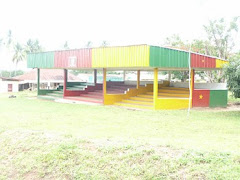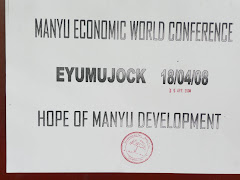
No Manyu artist in recent memory has influenced traditional pop culture the way Bate Nico has done. With a prolific silky rythmn, Arrey Bate Nico got inspiration to sing from his grandfather who was a custodian of the Manyu culture. He uses his music genre, form and style to promote and challenge cultural taboos and norms, believing music to be the most appropriate medium to communicate, heal, and emotionally connect with people of diverse backgrounds.
Bate Nico (alias) is the fourth child of a family of seven. Born to Pa Arrey Ebot Joseph and Ma Pauline Bate of Kembong, Nico began his musical career in 1987, three years before his maiden album named “Na Money di find money”. Soon after the release of that album, Bate was on a roller coaster though with difficulties finding a major producer. His love for music, especially folklore and translating Manyu tales did not slow down this future legend. As a writer and composer, he went on to produce 5 albums and over 20 singles.
This fervant artist is guided by a career that is lively and comprehensive, showing indefatigable wit, creativity and originality of vocals. He fully participates at national events like Mount Cameroon international race of hope amongst others. Bate’s musical troupe named “Ache Manyu” consist of his wife Nkongho Regina, two sons, a daughter and numerous dancers. Because of inclusion of typical traditional costumes and folklore in his rendition, the artist was nicknamed “Cultural ambassador”.
Bate's brand of folklore promotes the rich Manyu culture in an appealing sound bit. His music has enough verve vaulting his presence in homes across Manyu, Cameroon and the international scene. He displays a charming consistency on and off stage with alluring perfect and comforting tunes. The power of its catchy refrains simply makes you dance to sleep.
It is noteworthy to state that, Alias “Bate Nico” is a likeable personality with an ever pleasing smile, electrifying dance steps, great vocals and great sense of humor. His resourcefulness is a pride to Manyu, his peers, numerous fans and his country. It is for this reason that, this great star in the making and a future Manyu folklore legend is in great demand with concerts planned for North America, Europe and Africa. We are yet to see the best of Arrey Bate Nico.

 Computers in education can be the foundation for students to learn technology based skills which are desirable for and often demanded in today's job markets. Generally, being accustomed to utilizing systems or being computer literate at an early age can aid not only in developing motor skills but being competitive on the global stage. Working together with the private sector, parents and government officials must therefore seize the opportunity and make sure young minds are not wasted at an early age. On a larger scale, our governments and development advocates have a responsibility to ensure diffusion of computer technology in our schools does not remain a national policy and lofty goal in paper but in practice.
Computers in education can be the foundation for students to learn technology based skills which are desirable for and often demanded in today's job markets. Generally, being accustomed to utilizing systems or being computer literate at an early age can aid not only in developing motor skills but being competitive on the global stage. Working together with the private sector, parents and government officials must therefore seize the opportunity and make sure young minds are not wasted at an early age. On a larger scale, our governments and development advocates have a responsibility to ensure diffusion of computer technology in our schools does not remain a national policy and lofty goal in paper but in practice.


























